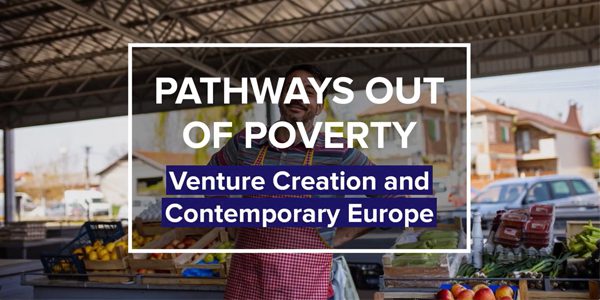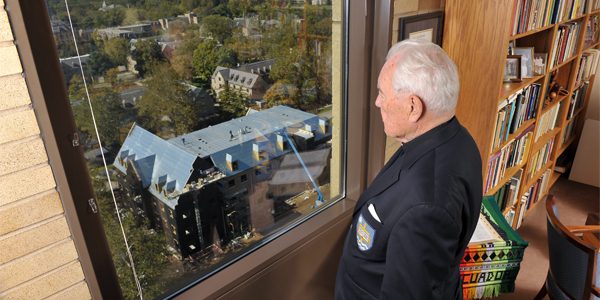Where We’re Going: The Global Citizen – National Viewpoint
Subscribe to the ThinkND podcast on Apple, Spotify, or Google.
Featured Speakers:
- Tara C. Kenney, Managing Director, Deutsche Asset Management
- Michael Camilleri, Senior Advisor to the Administrator and Executive Director of the Northern Triangle Task Force, USAID
- Ray Offenheiser, William J. Pulte Director and Professor of the Practice, Keough School of Global Affairs, University of Notre Dame
In the second session of Where We’re Going: The Global Citizen, moderator Ray Offenheiser reintroduced the concept of global citizenship, affirming the interdependence of people across nations saying, “our security depends on everyone’s security.” He elaborated on the idea that organizations like the United Nations welcomed in an era of global collaboration that we now refer to as global citizenship. Introducing the two guests, Offenheiser commended them for being global citizens in their daily lives.
The first guest, Tara Kenney, is a Notre Dame graduate who spent a number of years serving residents of Lima, Peru, through microfinance before relocating to New York, where she spent three decades working as a banker and investor for firms on Wall Street. Kenney shared that her life was centered around “three F’s: faith, financial background, and in Spanish, filantropía.” Her knack for finance and concern for the poor and vulnerable culminated in an impressive career of investing in social goods. The second guest, Michael Camilleri is also a Notre Dame graduate and has committed his life to work that largely focuses on human rights and Latin America. He attributes his “sense of responsibility to the community, both local and global,” to the teachers and mentors he crossed paths with during his time at the University. Camilleri’s professional life includes a vast array of experiences that all tie back to his commitment to human rights and Latin America.
At the beginning of the discussion, Offenheiser commented on a problem in Latin America where financing is directed mainly towards infrastructure and manufacturing. He called for a shift towards impact investing, which he described as investments that make both societal impacts and financial returns. Kenney elaborated on this idea, sharing that sustainable investing was formerly an elective class for students who felt called to do good, but is now the foundation of multiple mantras throughout the finance industry. She acknowledged that the first movements of socially responsible investing are largely rooted in religious communities, citing the Adrian Dominicans for giving $5 million to the organization that helped build up small businesses in Latin America. Kenney was proud to say that the financial contributions have helped “prove the poor could be reliable stewards of capital and help grow business and force change.”
Having more of a political influence compared to Kenney’s financial one, Camilleri shared how the participation of Inter-American Dialogue in Latin American politics has helped create common ground that benefits the dignity of the citizens in the countries involved. The program creates a safe space for diplomats to engage in political discussions with an aim to collaborate. Camilleri emphasized that the conversations that happen thanks to Inter-American Dialogue “generate not only ideas but also impact on critical issues.”
Alluding to the current realities of our world during the pandemic, Offenheiser asked the guests to address their hopes or worries about the state of Latin America. Kenney shared the fear that due to the economic situation in Latin America, they could go back to what is known as the “lost years.” However, Kenney shared that what gave her optimism was the knowledge that there are passionate members of the Latin American communities who won’t just be onlookers to trouble that comes. Camilleri agreed that human capital gives him hope, adding that while it is a challenge for change to come quickly from government cooperation, organizations that aren’t affiliated with a country’s politics, such as Notre Dame, are doing a great deal of good in educating future generations of leaders.
Offenheiser added his own concerns about the attention that both climate change and inequality demand on a global scale. The interdependency of this planet’s inhabitants make climate change a problem for everyone, and “inequality has become a global conversation” because it can compromise democracy. In understanding our role as a global citizen, the participants emphasized the importance of recognizing how the future of work is changing, and thus affecting people across the world. As Camilleri insightfully pointed out, we need to have “higher standards for globalization, not a backlash for the whole enterprise.”
- Financing in Latin America is dominated by the infrastructure and manufacturing sectors, but great benefits would come from shifting investments towards a social good and purpose.
- Impact investing focuses on generating measurable social benefits simultaneously with financial returns.
- Inter-American Dialogue helps create a safe space for conversations between global leaders, as well as a place for political collaboration to prosper.
- It is challenging for the U.S. government to build partnerships with individuals within a region when partnerships between their governments don’t work. This leaves an opening for other organizations to come in and engage the human capital of the region.
- Although definite problems have been raised by globalization, we should not reject the whole concept. Rather, it would be wise to have higher standards for the process.
- “Global citizenship came into our vocabulary as we began to realize that globalization was a real part of our lives.” — Ray Offenheiser, 2:09
- “[Large finances given to Latin America] might sound like pure altruism, but it established the link between the ability to invest for social change and return.” — Tara Kenney, 19:49
- “The most powerful asset that I have at my disposal is the ability to tap into this network of relationships with leaders … and bring those diverse levels of expertise to bear on a problem.” — Michael Camilleri, 25:54
- “At this challenging time [during the coronavirus pandemic], the U.S. has a lot to offer to Latin America.” — Michael Camilleri, 28:44
- “In the human spirit, there is the power to try and advance yourself, and that’s what [the poor] want — an opportunity.” — Tara Kenney, 47:22
Related Content
The Future of Work
November 30, 2023 marks one year into the ChatGPT era and one of the most pressing concerns we hear from all quarters is: How will this affect the future of work and what the...
View EventPathways Out of Poverty
The question of entrepreneurship as part of the solution to global poverty is receiving increasing attention from scholars, economic development professionals, government...
watch videoFr. Ted Said…Serving Others: Tom Purekal ’98
Notre Dame has a long and strong tradition of service and being a force for good. Fr. Hesburgh’s commitment to serving others was the seed that grew into impactful service...
watch video


